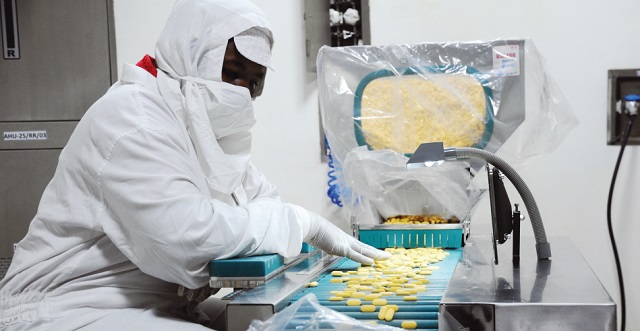
Addis Ababa, Ethiopia | Xinhua | Experts have called on African countries to expedite the local manufacturing of pharmaceutical products amid the continent’s dependence on externally manufactured medicines.
The experts made the call during a virtual meeting hosted by the UN Economic Commission for Africa (UNECA)’s AfCFTA(African Continental Free Trade Area)-anchored Pharmaceutical Initiative.
The meeting was an opportunity to showcase the AfCFTA-anchored Pharmaceutical Initiative and its journey, progress and experiences in the promotion of the manufacturing and pooled procurement of essential medications focused on reproductive, maternal and child health in and for the African continent, the UNECA said in a statement Friday.
Michel Sidibe, African Union (AU) Special Envoy for the African Medicines Agency (AMA), told the virtual event that Africa’s “dependence on externally manufactured goods was problematic as access to COVID-19 vaccines starkly reminded Africans.”
He said that local manufacturing of pharmaceuticals on the continent is no longer an option.
“The continent only produces 3 percent of the medicines consumed by its people. Pharmaceutical supply chains have multiple intermediaries,” a UNECA statement quoted Sidibe as saying.
He said that the intermediaries contributed to drugs being sold in Africa being the most expensive in the world while Africa has the highest prevalence of sub-standard and counterfeit medicines, with some countries are reaching as much as 30 percent.
“These challenges have been largely attributed to weak or absent drug regulatory systems, unclear policies and incomplete or inconsistent legal and regulatory frameworks in many cases. So, acting at this level is therefore critically important,” he said.
Sidibe stressed that the African pharmaceutical sector was expected to grow from 19 billion U.S. dollars in 2012 to 66 billion U.S. dollars in 2022. He said that the health and wellness sector in Africa would be worth 259 billion U.S. dollars by 2030 and this could potentially create up to 16 million jobs.
Sidibe said regulation would be essential to protect African citizens from sub-standard and falsified medicines. He emphasized that leveraging the AfCFTA would help build Africa’s research and development capacity.
According to figures from the UNECA, the African Continental Free Trade Area (AfCFTA) Agreement would integrate about 1.3 billion people, and potentially 2.2 billion people by 2050.
Jane Karonga, the AfCFTA-anchored Pharma Initiative’s Team Leader, stressed that stating that the rationale for the UNECA’s AfCFTA-anchored Pharmaceutical Initiative is to address the mismatch between supply and demand in Africa.
Karonga stated that medicines consume 45 to 60 percent of national healthcare budgets on the continent, largely made up of imported products.
According to the AU, the major challenges Africa’s pharmaceuticals industry often confronted with access to affordable financing; access to technology and technical know-how; inadequate human resource capacity; small fragmented markets and poor market intelligence; as well as fragmented and weak regulatory systems.
Chimwemwe Chamdimba, principal policy specialist at the AU Development Agency, on her part stressed that building national capacity is key to successful collaboration across regions and the continent.
She emphasized that all stakeholders would need to be invested in networking, information sharing and leveraging on available capacities.
 The Independent Uganda: You get the Truth we Pay the Price
The Independent Uganda: You get the Truth we Pay the Price



